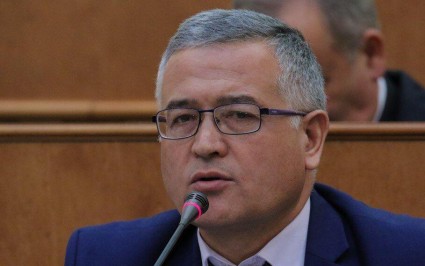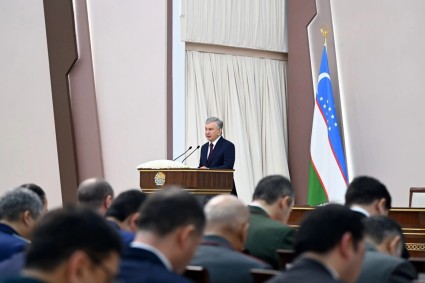The Ministry of Economic Development and Poverty Reduction (MEDPR) of the Republic of Uzbekistan, the World Bank, and the Regional Environmental Center for Central Asia (CAREC) held today the last meeting in a series of 11 policy dialogue roundtables on Green Growth and Climate Change. The event focused on the development of a strategic framework to accelerate Uzbekistan on a path to green transition.
From August 2021 to February 2022 Tashkent hosted the series of policy dialogues that facilitated an unprecedented multisectoral engagement by bringing together members of the Legislative Chamber of the Oliy Majlis, officials representing various ministries, state agencies, and municipal authorities, as well as leading national and international experts, academia, international organizations and financial institutions, and other stakeholders.
The policy dialogue roundtables, among other issues, focused on supporting the Government of Uzbekistan in building a green, just, and low-carbon industry and economy; developing climate resilience; mobilizing green finance; and helping elaborate a roadmap for accelerating the transition towards green growth and climate change.
These dialogues have led to the establishment of the Interagency Council for Green Economy, a technical inter-agency working group, and multistakeholder thematic working groups. As a result of this momentum, the green transition has been reflected as a priority in the new national development strategy for 2022-2026 and a new unit on the green economy has been established within the MEDPR.
Today’s 11th and final roundtable also marked the endorsement of policy recommendations and sectoral action plans. It has also launched stakeholder consultations for the Green Transition Framework to implement the green economy strategy for 2019-30, which the MEDPR will lead through the first quarter of 2022.
“For a successful transition to a green economy by 2030, ambitious, clear, and quantified targets need to be defined in accordance with the country’s priorities for the next few years. To achieve these objectives, effective mechanisms will need to be implemented, including instruments to promote green finance, innovation and technology development and to engage science and engineering institutes, community organizations, and business through public-private partnerships and promotion of competition, among others,” noted Mr. Ilkhom Norkulov, First Deputy Minister of Economic Development and Poverty Reduction of Uzbekistan in his remarks during the roundtable.
Uzbekistan stands to gain enormously from ‘greening’ its ambitious economic and market transition based on the sustainable and efficient use of natural and energy resources that minimizes pollution, reduces climate and environmental impacts, and strengthens resilience to natural disasters and climate change. It would allow the country to transition away from carbon-intensive growth and become a green growth champion in Central Asia.
“Supporting the policy dialogues, the World Bank remains committed to continuing to be the Government’s trusted partner and furthering the collaboration with other development partners and stakeholders on this agenda. Jointly with MEDPR and other partners, we have launched a full set of activities to accompany Uzbekistan on its green path. These include, for example, a recently published note: Uzbekistan: Choosing an Innovative and Green Future, a Climate and Environment Institutional Assessment, and the Long-Term Strategy for Decarbonization,” said Marco Mantovanelli, World Bank Country Manager for Uzbekistan. “Bearing in mind the importance of the green transition for Uzbekistan’s development, the new World Bank Group Country Partnership Framework for Uzbekistan for 2022-2026 envisages additional financial and analytical support for Uzbekistan’s transition to a green and more sustainable economy.”
“We are glad that our hard work has resulted in the development of a road map and institutional conditions enabling the next steps on a path to a green economy and climate change mitigation and adaptation,” said Zafar Makhmudov, Executive Director of CAREC. “This series of policy dialogues is not only about the green transition but also about a sustainable and resilient future for Uzbekistan. Moreover, sustainable development of every country in Central Asia is critical to ensuring climate resilience of the entire region.”















